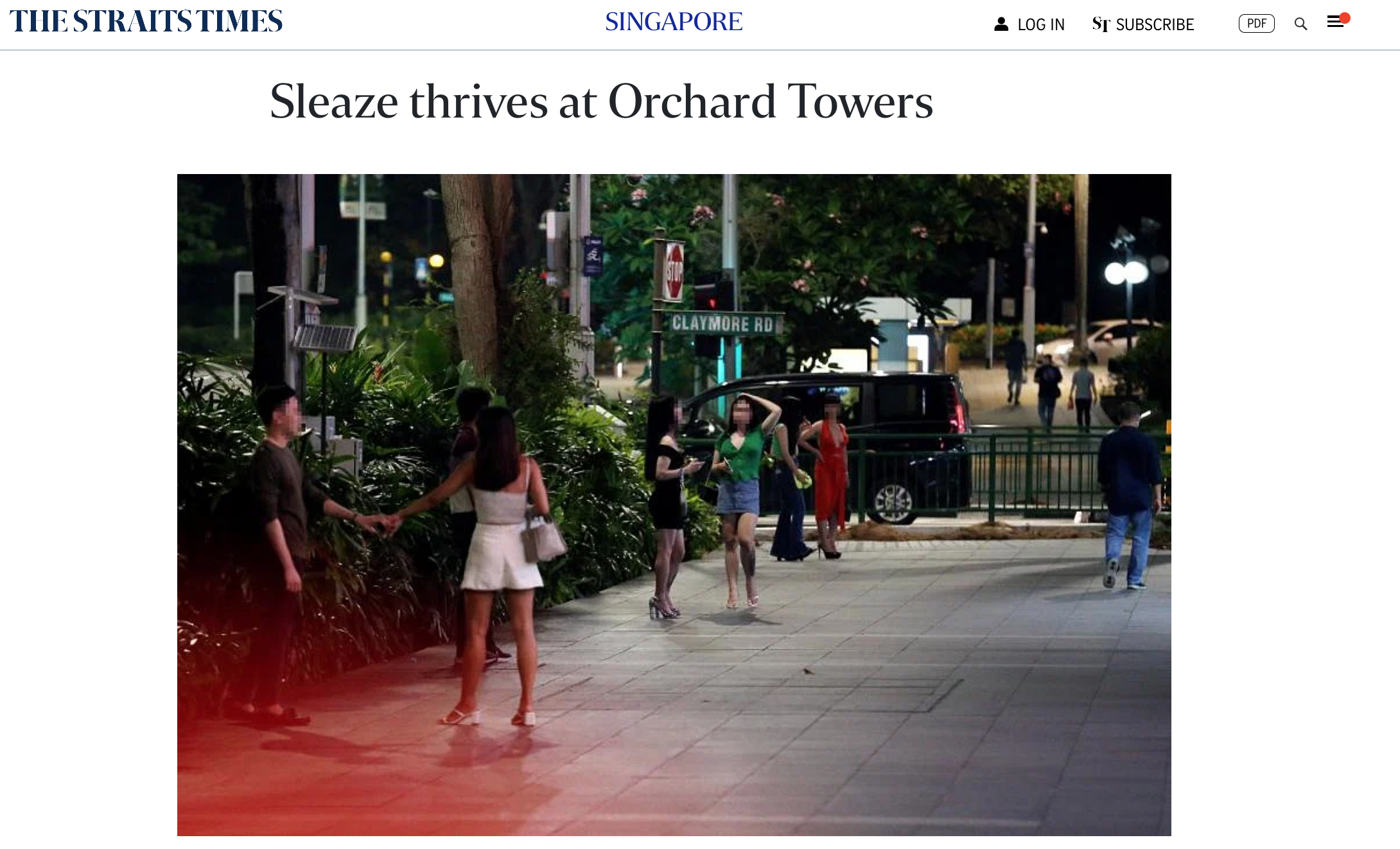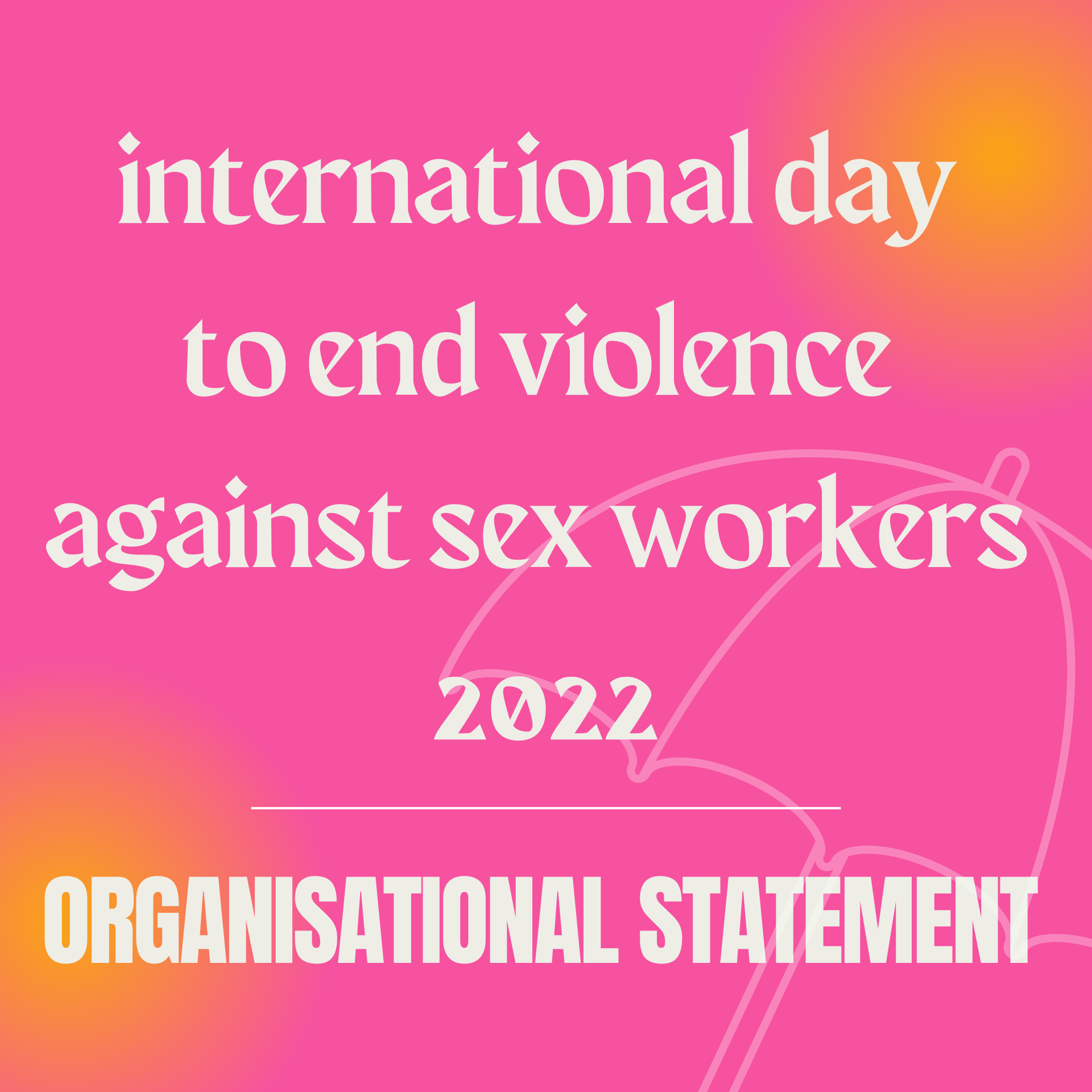To condone violence against sex workers undermines the principle of rule of law in Singapore. Like the rest of us, sex workers in Singapore deserve to be treated with dignity and have their agency acknowledged. Did you know? According to the Saw Swee Hock School of Public Health, there are approximately 4200 sex workers in Singapore as of 2019. Anyone you know can be a sex worker. Sex workers are our mothers, our siblings, our friends, our students, our teachers and they can definitely be your neighbour. To end violence against sex workers is to work within the intersections of gender equality, racial justice, migrant worker and labour rights, and harm reduction.
Sex work is work. One might do it because it gives leeway over time that most jobs can’t afford, allowing them to care and provide for their families. One might do it to support themselves through higher education. One might even do it because they genuinely enjoy sex and want to share the joy of bodily pleasures with others. No matter their reason for being in this line of service, one should be able to feel safe while working.
THEN
In our 2017 CEDAW report, we listed the following as violence against sex workers:
- Harmful and prejudiced media portrayals
- Unfair or discriminatory arrest practices
- Direct Violence
- Fear of reporting violence to the police
- Transphobia motivated forms of direct and systemic violence
In the 5 years since this report was written, how far have we moved on from such documented violence?
NOW
i. Harmful and Prejudiced Media Portrayals
In 2017, we called out the media for publishing the (sometimes blurred) faces of sex workers as part of their coverage of vice raids. We said that the “sensationalistic portrayal of sex workers demeans and dehumanizes them, encouraging public prejudices, further feeding the stigma that causes social ostracization, employment discrimination, and violence.” We urged the media to recognise sex workers’ right to be innocent until proven guilty, and to respect sex workers’ right to privacy.
This year, we saw the continued shaming of sex workers vis-a-vis media reportage of raids of various sex work establishments, and in particular, of the workers at Orchard Towers.
In August, it was announced that nightclubs and bar operators in Orchard Towers will no longer have their entertainment licence renewed past May 2023. Orchard Towers was painted in the media for having a “law and order situation” over its “notorious reputation for sleaze”.

Shortly after, we witnessed frequent arrests of its tenants, which ultimately culminated in the management’s eviction of sex workers from the building. Many have lost their work spaces, rental deposits and consequently, jobs. As they leave Orchard Towers, many sex workers expressed a sense of disappointment and indignation as they are forced to take the blame for the ‘sleazy’ and ‘dangerous’ environment of Orchard Towers when the truth is it has existed as an adult entertainment district for the past 30 years, and many people and society writ large have benefited from it being such.
ii. Unfair or discriminatory arrest practices
In 2017, we called out the use of condoms as evidence for sex work, profiling of transgender women as sex workers, entrapment, and deportation of migrant sex workers without due process as unfair or discriminatory arrest practices.
We cannot talk about the past few years without reflecting on the consequences of the COVID-19 pandemic. Even with a hard-hitting pandemic that many labelled as “the great equaliser”, the impact on sex workers was disproportionate. Entertainment workers in Singapore were the first to go into lock down, excluded from governmental support as they were mostly migrant workers, then later blamed and punished for the KTV cluster.
Meanwhile the patrons who kept this demand ongoing were assured of their privacy and confidentiality. This harsh spotlight shone on the KTV industry resulted in a CNA Documentary, interrogating the “long-tolerated industry”, where Project X was invited to share our insights. The glaring double standards remain, and now that nightlife is back in full swing here, it is worth revisiting the questions raised by our executive director, Vanessa Ho.
“We often think about how we can protect the businesses. But we never thought about, Okay what about the hostesses, the waitresses, how do we protect the workers? When nightlife opens again, how do we protect the workers who have been forced underground?”
All around Singapore, police raids and unfair arrest practices such as entrapment have continued to induce fear and anxiety to the sex work community. From 21st November to 14th December, Singapore saw the largest islandwide enforcement blitz, involving over 1,300 police officers deployed. In 44 Arrested in KTV in KTV Raid, as part of largest enforcement blitz since start of pandemic, customers were told to leave while female workers were instructed to wait in a room. Where do you think the customers will go next?
iii. Direct Violence
In 2017, we reported that clients of sex workers were the top most common perpetrators of abuse against sex workers.
We are heartened to see some convictions and reportage of such abusers in the past 5 years. Some notable cases in the past year include:
- April 2022. Alagar Balasubramanian was sentenced to 41 months’ jail for trafficking three female performing artistes, of whom two he physically assaulted. He had hired the women to work as performing artistes at a club, took away their passports and mobile phones, subjected them to debt bondage, and threatened to physically harm them if they returned to their home countries without his approval.
- August 2022, serial conman Tan Chip Huat was sentenced to nine years’ corrective training for cheating 10 women of over $72,000 including a teenager looking for a sugar daddy. He pretended to be well-off and offered money to women, including teenagers, for sexual services, but he never paid them. We were involved in one case, where we assisted the victim to make a police report.
- In September 2022, Patian Sohag was sentenced to three-and-a-half years’ jail and three strokes of the cane for raping a 53-year-old sex worker who was forced into illicit intercourse while she was deep asleep.
- October 2022: Muhammad Nazri Sapar, was convicted for luring a woman into becoming a sex worker and blackmailed her over four years.
- November 2022. Fahd Siddiqui, a 20 year old full-time National Serviceman tried to use his police status get sexual services from three social escorts in exchange for not taking enforcement action against them. Thankfully, he was arrested and two of the social escorts were directed to Project X for social support and aid when they were detained and kept from returning to their home country. Both described the entire process to be deeply traumatising and fear returning to Singapore.

Image of Fahd Siddiqui (Source: Kelvin Chng)
Sex workers’ vulnerabilities in the face of violence need to be urgently addressed. Ashwin Ganapathy, defence lawyer for Patian shared that “I would go as far to say that her vulnerability is amplified, because she’s a sex worker, and sex workers are far more vulnerable because of their reluctance to come forward.” Sex workers’ reluctance to come forward emboldens abusers and is a threat to other sex workers, and society as a whole.
iv. Transphobia motivated forms of direct and systemic violence
The “yellow card” system does not accept pre-op and non-op transgender women to work within regulated brothels. This often leaves them to work freelance with no protection of rights, rendering them as “undocumented” sex workers. Street-based transgender sex workers have shared with us their experiences of being harassed, wage theft committed against them and physical violence enacted by drunk customers.
The likeability of raids happening for “undocumented” sex workers becomes even more daunting for transgender women as we have been notified of instances in which they were placed in male lock-up.
We need to recognise the forces that push transgender women into sex work, and address those inequalities in society rather than subjecting them to incarceration.
v. Fear of reporting to the police
“I have observed that within the sex worker community, there may be some who would have the tendency to dismiss abuse that they have experienced due to how commonly such incidences occur, and that seeking recourse can be a hassle and arduous.” – Sherry Sherqueshaa
Ideally, a worker of any occupation and work environment should not only be protected from the possible risks and dangers of their occupation, but also have a place or a person they can turn to when their rights are violated. Sex workers have often turned to us for assistance, citing reasons such as they were not sure who to turn to, that they were afraid of accessing mainstream services for fear of legal repercussions and/or that mainstream services did not cater to their needs. We have had to attend to abuse cases ranging from financial, sexual and physical violence to even harassment and stalking of sex workers.
If we as a society recognise the need for a sex industry, then we must do our utmost to protect the people who provide the services.
We are also aware that the road to institutional change will be a long and arduous one – one that requires collaboration. We have made previous recommendations that we would implore for policy makers and the government to consider:
- Stop using condoms and lubricants as evidence of sex work
- Uphold rule of law and respect that people should be proven guilty in a court of law
- Work towards the full decriminalisation of sex work, recognising adult, consensual sex work as a form of work
- Establish anti-discrimination laws to protect sex workers and transgender women against discrimination and violence, including discrimination by employers, landlords, healthcare providers and other authorities.
- Repeal the travel ban for sex workers and people living with HIV (immigration act Section 8)
As we push for institutional and policy changes, we also ask that members of the public would stop and call out stigmatising and violent acts towards sex workers. Like you, they are mothers, daughters, friends, colleagues and more. Why shouldn’t they be entitled to the same rights as the rest of us?
Sources:
- Ho, Vanessa, “CEDAW 68th Session Stakeholders Report by Sex Workers in Singapore”. Project X. 2017. Accessed December 13,2022. https://theprojectx.org/wp-content/uploads/2022/12/2017-Singapore-CEDAW-Stakeholders-Report-by-Project-X-68th-Session-final.pdf
- Choo, Daryl, “No license renewal for Orchard Towers clubs: Nightlife association calls for talks with police, appeal board”. Today. August 18, 2022. Accessed December 13, 2022. https://www.todayonline.com/singapore/no-licence-renewal-orchard-towers-nightclubs-police-appeal-1972616
- Lam, Lydia, “Man carried off sleeping sex worker in Geylang for ‘forced illicit intercourse’, gets jail and caning.” The Straits Times. September 16, 2022. Accessed December 13, 2022. https://www.channelnewsasia.com/singapore/man-jail-caning-abducting-woman-geylang-lane-sex-worker-court-2942921






